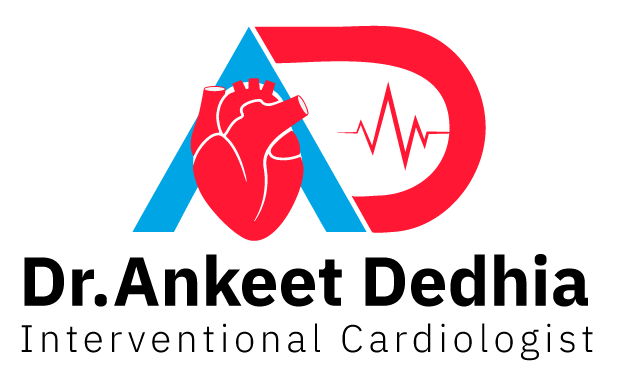Don’t Ignore These Signs: How to Tell If It’s a Heart Attack
A heart attack, medically known as a myocardial infarction, occurs when the blood flow to the heart is severely reduced or completely blocked. This can happen due to a buildup of fat, cholesterol, and other substances that form plaque in the arteries. Recognizing the signs of a heart attack is crucial because timely medical intervention can save lives. In this blog, we’ll discuss how to know if you’re experiencing a heart attack and what steps to take if you suspect one.
Common Symptoms of a Heart Attack
- Chest Pain or Discomfort- Chest pain or discomfort is the most typical indication of a heart attack. This may feel like pressure, squeezing, fullness, or pain in the centre or left side of the chest. The sensation often lasts for more than a few minutes or may come and go.
- Upper Body Discomfort- Pain or discomfort can spread beyond the chest to the shoulders, arms, back, neck, jaw, or even the upper stomach. It may feel like a dull ache or more severe pain.
- Shortness of Breath – Experiencing shortness of breath can occur with or without chest discomfort. It may happen while at rest or during physical activity.
- Cold Sweat – Unexpectedly breaking out in a cold sweat can be an indication of a heart attack.This symptom may be accompanied by other symptoms like nausea or lightheadedness.
- Nausea or Vomiting – Some people may feel nauseous or vomit during a heart attack, often mistaken for stomach problems.
- Lightheadedness or Dizziness – Feeling lightheaded or dizzy is another potential symptom of a heart attack. This can be due to a sudden drop in blood pressure or poor blood circulation.
- Fatigue – Unexplained fatigue, especially in women, can be an early warning sign of a heart attack. It may feel like extreme tiredness that is unusual for the person.
Atypical Symptoms in Women
While chest pain is the most common symptom in both men and women, women are more likely to experience atypical symptoms, such as:
- Shortness of breath
- Nausea or vomiting
- Pain in the back or jaw
- Lightheadedness or fainting
- Unexplained fatigue
These symptoms can be subtler than the classic signs and are sometimes mistaken for other conditions. Therefore, it is essential to be aware of these variations to ensure timely medical attention.
What to Do If You Suspect a Heart Attack
- Call Emergency Services Immediately – If you or someone around you is experiencing the symptoms of a heart attack, call emergency services right away. Do not wait to see if the symptoms go away.
- Take Aspirin – If advised by a healthcare provider, chew and swallow an aspirin while waiting for medical help. Aspirin helps to thin the blood and can reduce the severity of the heart attack.
- Stay Calm and Rest – Try to stay as calm as possible. Sit down and rest while waiting for the ambulance. Do not try to drive yourself to the hospital.
- Follow the Emergency Personnel’s Instructions – Once help arrives, follow the instructions of the emergency personnel. They will likely perform an electrocardiogram (ECG) and administer oxygen or other medications.
Preventing a Heart Attack
While recognizing the signs of a heart attack is vital, prevention is equally important. Here are some steps to reduce your risk:
- Make sure your diet is balanced and full of nutritious grains, fruits, and veggies.
- Exercise regularly to keep your heart healthy.
- Avoid smoking and limit alcohol consumption.
- Use calming methods to reduce stress, such as yoga or meditation.
- Monitor your blood pressure, cholesterol, and glucose levels.
Taking proactive steps to protect heart health is crucial for young people. Here are some tips-
Conclusion
Knowing the signs of a heart attack and acting quickly can save lives. Remember that not all heart attacks present with dramatic symptoms; some can be subtle, particularly in women. If you or someone you know experiences any of the symptoms discussed, seek medical attention immediately. Early intervention can significantly improve outcomes and prevent severe heart damage.
By being informed and vigilant, you can protect yourself and others from the devastating effects of a heart attack. Stay heart-healthy and prioritize regular check-ups with your healthcare provider to keep your heart in top condition.
FAQ
Frequently Asked Questions
A heart attack occurs when the blood flow to a part of the heart is blocked, typically by a blood clot. This can cause damage to the heart muscle if not treated quickly. The medical term for a heart attack is a myocardial infarction.
A heart attack is caused by a blockage that stops blood flow to the heart, while cardiac arrest occurs when the heart suddenly stops beating. A heart attack can lead to cardiac arrest if not treated promptly.
Yes, women are more likely to experience atypical symptoms such as fatigue, nausea, back or jaw pain, and shortness of breath, in addition to the more common chest pain.
Call emergency services immediately. Do not drive yourself to the hospital. If advised by a healthcare professional, take an aspirin to help reduce the severity of the heart attack while waiting for help.
Yes, heart attacks can often be prevented by maintaining a healthy lifestyle. This includes a balanced diet, regular exercise, avoiding smoking, limiting alcohol intake, and managing stress, blood pressure, and cholesterol levels.
Risk factors include high blood pressure, high cholesterol, smoking, diabetes, obesity, a sedentary lifestyle, excessive alcohol consumption, stress, and a family history of heart disease.



